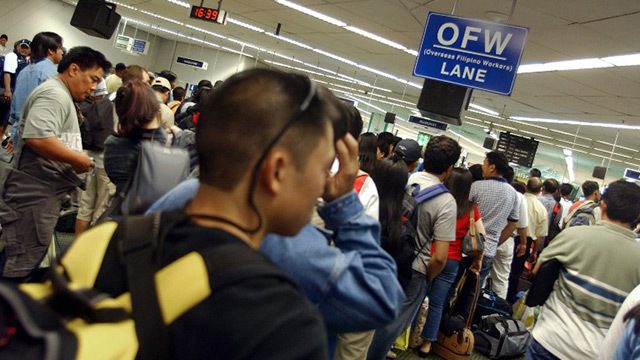SUMMARY
This is AI generated summarization, which may have errors. For context, always refer to the full article.

MANILA, Philippines – The House committees on government reorganization and on overseas workers affairs have approved the creation of a technical working group that will consolidate proposals for a department dedicated to overseas Filipino workers (OFW).
The House panels approved the motion of Deputy Speaker Sharon S. Garin in a joint hearing on Thursday, November 11.
ACTS-OFW Representative Aniceto III D. Bertiz III will head the technical working group’s head, with Manila Teachers Representative Virgilio Lacson, Kabayan Representative Ron P. Salo, and PBA Representative Mark Aeron H. Sambar as members.
The technical working group will consolidate a total of 6 bills seeking to create the Department for Overseas Filipino Workers (DOFW) envisioned to “provide prompt, immediate, and effective response to the problems and needs of OFWs.”
These are House bills 227, 288, 543, 822, 1936, and 2334.
Urgently need
At the joint hearing, Lacson said the creation of a single entity devoted to OFWs had been pushed since the 12th Congress. The proposed department would promote the welfare, rights, and needs of OFWs in recognition of their huge contribution to the national economy.
Arenas said there is an “urgent need” for an agency that will take full charge of the deployment and repatriation of OFWs, when the need arises.
“There should be one agency which will be made accountable to the OFWs and their families,” she said.
Romero, for his part, said that in 2015, OFWs contributed about 9.8% of the country’s gross domestic product and 8.3% of the gross national income.
“It is high time that our OFWs feel the support and protective care of our government by creating the DOFW that will specifically cater to their needs,” he said.
Meanwhile, Quezon City 2nd District Representative Winston Castello asked the joint panel to give government agencies 10 days to submit their position papers on the proposed DOFW.
Department of Migration and Development
The hearing also discussed HB 192 and HB 3255, authored by Bertiz and DIWA Representative Emmeline Aglipay-Villar respectively, both seeking to create the Department of Migration and Development (DMD). The proposed agency will recommend and implement the government’s policies and programs to promote the protection, safety, development, support of and for Filipino migrants and families.
Bertiz said while the present bureaucracy serving the OFW sector is mainly focused on Filipino migrants’ departure, the DMD seeks a full migration cycle in promoting migrants rights, from pre-employment to on-site services.
“The purpose of the DMD is not to push people out – that will always be their personal choice – but to make sure that while they are out there working, the support system until they return is cohesive, developmental in approach and protective in nature,” said Bertiz.
Bertiz said the DMD shall also address the social cause of migration and shall minimize, if not totally eliminate, the “turf” problems especially in times of crisis. This, he said, would keep government officials from passing blame whenever a crisis happens in host countries.
Reservations
Scholars and a migrant group have previously expressed skepticisms about the proposed DMD.
The Center for Migrant Advocacy-Philippines (CMA) and the Working Group on Migration of the Political Science Department of Ateneo de Manila University (WGM), earlier said, “The proposal to establish a separate Department on Migration and Development must be studied carefully and discussed by all stakeholders.”
The two groups warned that “a separate department could send the wrong message to the public that migration-for-work is to be promoted further as its establishment signals a level of ‘permanence.’”
They also said the proposed agency “can cause displacement of government employees in existing migration-related agencies.”
The Philippine Migrants Rights Watch (PMRW), for its part, said it is “heartened” by the proposal but has reservations. In a statement in September, the group sought answers to the following questions:
- How will the new department do better than the current system?
- How many laws will have to be revised?
- Who will be the lead department responsible for the protection of Filipinos overseas?
- What is the main scope of the proposed department?
- If the main issue is streamlining and coordination, what is the best solution?
During the campaign period for the May 2016 elections, President Rodrigo Duterte also promised to establish a department for OFWs, which he reiterated in his first State of the Nation Address (SONA). – Rappler.com
Add a comment
How does this make you feel?
There are no comments yet. Add your comment to start the conversation.